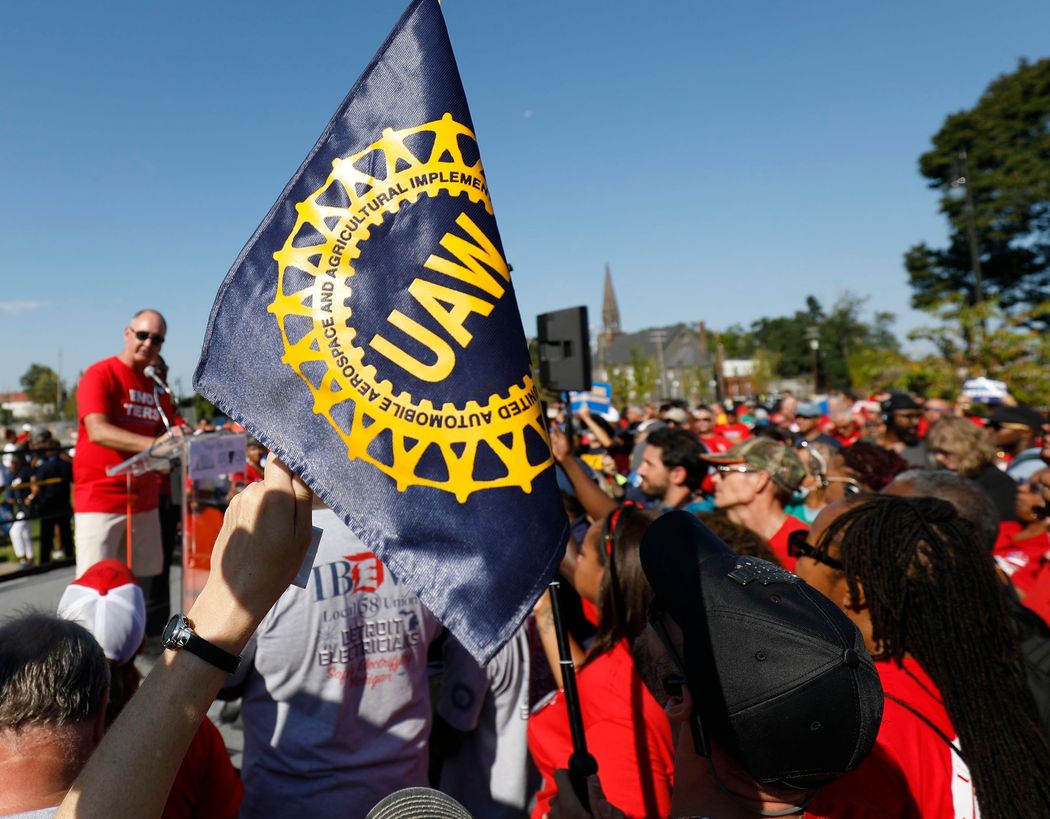
Gilbert Placeres is a student at Harvard Law School.
In today’s News & Commentary, Shawn Fain calls for a general strike on May Day 2028, House Democrats release a report calling out toothless penalties for labor and employment law violations, and University of California graduate workers will vote on striking in response to protest crackdowns.
In In These Times, UAW President Shawn Fain called on all unions to align their contract expiration dates with May Day 2028 to prepare for a general strike. He believes uniting across industries and countries will make the labor movement much more powerful, citing the Teamsters commitment not to deliver parts to struck plants during the UAW’s historic Big 3 automakers strike last year. He argues the labor movement needs to think bigger and unite across countries to combat a “race to the bottom” where countries locate production in places with cheap labor, weak environmental standards, and generous tax cuts and subsidies. American unions, according to him, need to accept the “hard truth” that “it is impossible to protect American jobs while ignoring the plight of everyone else.” He closes by calling on the labor movement to “spend the next four years getting prepared” for a general strike that can win universal healthcare and a right to retire with dignity.
Democrats on the U.S. House Committee on Education & the Workforce released a report highlighting the weakness of civil penalties on employers who violate workers’ rights and calling for them to be strengthened. The report argues the low penalties do not deter employers from violating labor and employment law but instead can be absorbed as part of the “cost of doing business.” For instance, the median penalty by OSHA when a worker gets killed on the job ($14,063) is less than the median CEO car allowance ($15,000). Titled “A Slap On The Wrist: How It Pays For Unscrupulous Employers To Take Advantage Of Workers,” the report focuses on penalties for illegally employing children, stealing workers’ wages, violating organizing rights, unsafe workplaces, and failing to provide essential mental health and substance use disorder benefits. A write-up on the report describes it as a response to an employer crime spree, given the estimated yearly $50 billion in wage theft and nearly 20,000 reported unfair labor practices last year.
Lastly, the largest union of academic workers, UAW Local 4811, representing over 48,000 graduate student workers in the University of California system, is planning to hold a strike authorization vote in response to how the UC system has cracked down on students’ Gaza protests. These graduate workers last went on strike in November 2022 for a new contract, the largest strike ever in American higher education. They voted earlier this year to call for a ceasefire in Gaza by a margin over nine to one. According to union leadership, the strike authorization vote is “to hold the university accountable and demand the university respect the members’ right to protected speech and right to protest,” although it is still unknown if the strike would include workers across the UC system or just at UCLA. They will also be filing an unfair labor practice charge over the use of the Los Angeles police department against protesters and for unilateral policy changes in response to protests. In a statement in response to the arrests at protests last week, UAW President Shawn Fain said “This war is wrong, and this response against students and academic workers, many of them UAW members, is wrong. We call on the powers that be to release the students and employees who have been arrested, and if you can’t take the outcry, stop supporting this war.” Relatedly, UAW Region 9A director Brandon Mancilla recently gave an interview to Jacobin on “Why the UAW Should Stand in Solidarity with Palestine.”






Daily News & Commentary
Start your day with our roundup of the latest labor developments. See all
March 3
In today’s news and commentary, Texas dismantles their contracting program for minorities, NextEra settles an ERISA lawsuit, and Chipotle beats an age discrimination suit. Texas Acting Comptroller Kelly Hancock is being sued in state court for allegedly unlawfully dismantling the Historically Underutilized Business (HUB) program, a 1990s initiative signed by former Governor George W. Bush […]
March 2
Block lays off over 4,000 workers; H-1B fee data is revealed.
March 1
The NLRB officially rescinds the Biden-era standard for determining joint-employer status; the DOL proposes a rule that would rescind the Biden-era standard for determining independent contractor status; and Walmart pays $100 million for deceiving delivery drivers regarding wages and tips.
February 27
The Ninth Circuit allows Trump to dismantle certain government unions based on national security concerns; and the DOL set to focus enforcement on firms with “outsized market power.”
February 26
Workplace AI regulations proposed in Michigan; en banc D.C. Circuit hears oral argument in CFPB case; white police officers sue Philadelphia over DEI policy.
February 25
OSHA workplace inspections significantly drop in 2025; the Court denies a petition for certiorari to review a Minnesota law banning mandatory anti-union meetings at work; and the Court declines two petitions to determine whether Air Force service members should receive backpay as a result of religious challenges to the now-revoked COVID-19 vaccine mandate.